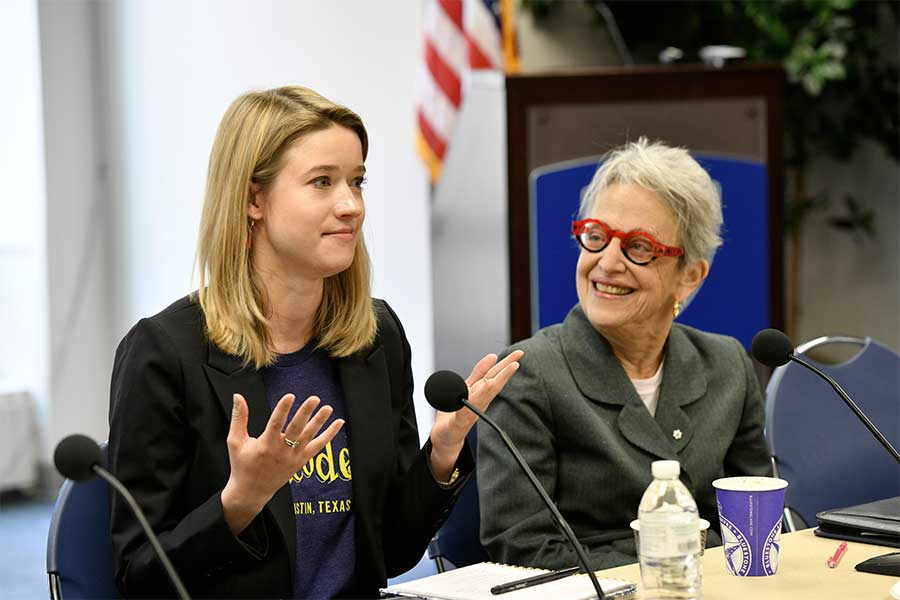Kissinger Center Convenes Cross-disciplinary Cohort of Junior Scholars to Craft Policy-relevant Research

January 8, 2020
The Kissinger Center hosted a two-day workshop for 17 PhD candidates to engage in conversation and debate with academics, practitioners and policy-makers on pressing issues related to international affairs and national security. The two-day workshop launched with a presentation exercise that allowed students to present evaluations of counterfactuals to the policy choices implemented in five of the most critical junctures for US involvement in the Syrian Civil War. Students then took on the role of advisor to the Deputy Secretary of State in an exercise meant to simulate developing responses to and strategies for current military and foreign policy challenges that involve several other state and non-state actors, geographical conflict, countering extremist forces, preventing and managing a refugee crisis all while revealing the complexities of preparing a policy position. Finally, students were able to hear from those policy-makers engaged in crafting parts of US Syria policy.
The workshop also included the opportunity for students to network with representatives from a variety of career paths available to PhD candidates including careers in academia, international organizations, the private sector, think tanks, federally funded research centers, and national security.
The workshop featured two topical panels: Governing Disruptive Technology and Reconciling Domestic Opinion with U.S. Foreign Policy. The first centered on answering fundamental questions policy-makers face in governing disruptive technologies including (i) how to use historical analogies that could provide precedent for a response to the trends in emerging tech; (ii) understanding the threats data mining, surveillance capitalism, AI and autonomous weapons pose to international security; and (iii) what sorts of challenges disruptive technologies actually pose to vulnerabilities in our national security infrastructure. Kathleen Hicks, Senior Vice President at CSIS, moderated and the panelists included Michael Horowitz, Professor at the University of Pennsylvania, Janice Stein, Professor at the University of Toronto, and Elaine Sedenberg who provided insight from the tech industry.
The panel on Domestic opinion on US Foreign Policy was moderated by Bruce Jentleson, Professor at Duke University and included Norm Ornstein, Resident Scholar at American Enterprise Institute (AEI), Richard Fontaine, CEO of the Center for New American Security (CNAS), and Dina Smeltz, Senior Fellow at the Chicago Council on Global Affairs as panelists. The panel sought to open a conversation on resolving the discrepancies between US political opinion and policy and answer questions on how much public opinion matters in formulating foreign policy and the difficulty of implementing policy solutions to major issues where there is consensus, like climate change and maintaining alliances.
The Cohort Members that Attended the DC Policy Workshop Include:
1. Shazeda Ahmed, University of California, Berkeley
2. Rebecca Dudley, Duke University
3. Andrew Ehrhardt, Kings College London
4. Abby Fanlo, Stanford University
5. Dani Gilbert, The George Washington University
6. Meghan Herwig, University of Virginia
7. Lindsay Hundley, Stanford University
8. Kendrick Kuo, The George Washington University
9. Jason Jung Jae Kwon, MIT
10. John Minnich, MIT
11. Aroop Mukharji, Harvard Kennedy School
12. Mina Ericka Pollmann, MIT
13. Will Quinn, Johns Hopkins SAIS
14. Katherine Russell, Syracuse, Maxwell School
15. Henry Tugendhat, Johns Hopkins SAIS
16. Pei-Yu Wei, Duke University
17. Laura White, University of Virginia
The IPSCON initiative is sponsored by the Carnegie Corporation of New York. You can learn more about the program here.